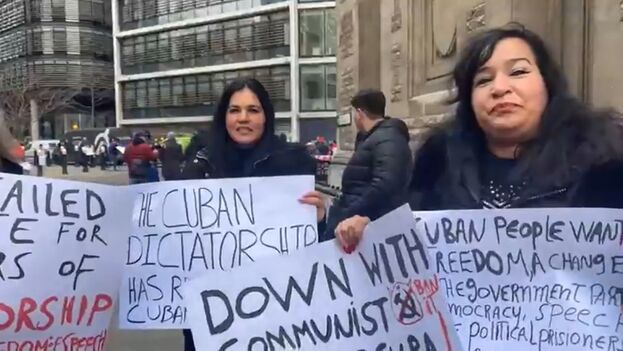
![]() 14ymedio, Madrid, 4 April 2023 — The High Court of Justice in London ruled on Tuesday in favor of the investment fund CRF I Limited by recognizing its rights to a debt of 72 million euros contracted by the Island, although it has released the Cuban State from its direct responsibility. Judge Sara Cockerill has awarded a small technical victory to the regime by identifying the creditor as the Banco Nacional de Cuba (BNC), which does not change anything fundamentally since this entity has been subsumed into the Banco Central de Cuba (BCC), and, ultimately, the Cuban State must assume the debt contracted by its own institutions.
14ymedio, Madrid, 4 April 2023 — The High Court of Justice in London ruled on Tuesday in favor of the investment fund CRF I Limited by recognizing its rights to a debt of 72 million euros contracted by the Island, although it has released the Cuban State from its direct responsibility. Judge Sara Cockerill has awarded a small technical victory to the regime by identifying the creditor as the Banco Nacional de Cuba (BNC), which does not change anything fundamentally since this entity has been subsumed into the Banco Central de Cuba (BCC), and, ultimately, the Cuban State must assume the debt contracted by its own institutions.
Once this preliminary question has been resolved, the magistrate declared herself “competent to judge the debt claims presented” in the London court and will be able to enter the merits of the lawsuit on a date yet to be determined. However, Havana can appeal this ruling, which opens the door to a demand from CRF for the entirety of the Cuban sovereign debt it owns, some 1.2 billion euros.
Initially, the news was disseminated by the official press and signed by the official spokesman Humberto López, who had privileged access to the resolution and prioritized the part of the sentence dedicated to the technical point of little relevance – “CRF is not a creditor of the Cuban State” – to present it as a victory: “It means that the Republic of Cuba is out of the lawsuit.” However, he could not hide the most important thing: “From now on the process will continue only against the Banco Nacional de Cuba, which will have the right to establish the claims that English law allows.”
The resolution, however, devotes extensive paragraphs to explain why the trial is going ahead and insists that although the BNC “lacked the capacity to consent on behalf of Cuba,” it did so on its own behalf and therefore “the debts represented by the agreements were validly assigned.”
The judge considers that the CRF has, consequently, “the right to rely on the contractual provisions contained therein in terms of the jurisdiction of the English court,” which makes it “competent to judge the debt claims presented here.”
The decision satisfied the investment fund, which indicated, through its president, David Charters, its interest in “finding a solution with Cuba that (has) zero impact on its budget for at least five years, recognizing the difficult economic situation that crosses the country.”
“Cuba gained a technical point in this sentence that we have already corrected and we do not expect this matter to affect the eventual final result, which is a complete victory for CRF,” he added with regards to what remains to be determined.
The litigation began at the end of January in the London court after the venture capital fund CRF I, founded in 2009 and based in the Cayman Islands, sued the Island for considering itself the largest holder of the Island’s sovereign debt.
The BNC is today a commercial bank, but until 1997 it operated as Banco Central de Cuba (BCC). The BCN continued to be responsible for the registration, control and servicing of the debt it had placed until the creation of the BCC, which is why it is a defendant.
The debt originated from two loans that Cuba closed in 1984 with the European banks Crédit Lyonnais and L’Istituto Bancario Italiano, with the BNC as guarantor. Three years later, Fidel Castro declared his country’s debt “unpayable” – and in general that of all the former colonies – and the Island stopped complying with its creditors until Raúl Castro, in 2006, changed this policy.
Cuba renegotiated its debt with the Paris Club, but not with the London Club, to which CRF I belongs, which claims to have received no response from Havana in the seven years during which it tried to make contact. For the regime, the fund, which it describes as a “vulture,” is not a legitimate creditor, since it obtained this debt illegally, bribing a BNC employee who was convicted of bribery on the island and had to testify in the trial from jail where he is serving a 13-year sentence for bribery.
In addition, the defense of the Cuban Government alleged that the established procedures were not followed: obtaining two signatures and government authorization.
CRF I rejected the accusation of bribery and doubted the veracity of the imprisoned official’s testimony. He further stated that it acquired the debt correctly and is, therefore, a legitimate creditor.
Dozens of opponents went to London during the trial to protest at the gates of the court against the Cuban regime and urging the judge to force the Government to pay, although what was being resolved in court was not that issue, but the legitimacy of the fund as a creditor
____________
COLLABORATE WITH OUR WORK: The 14ymedio team is committed to practicing serious journalism that reflects Cuba’s reality in all its depth. Thank you for joining us on this long journey. We invite you to continue supporting us by becoming a member of 14ymedio now. Together we can continue transforming journalism in Cuba.
